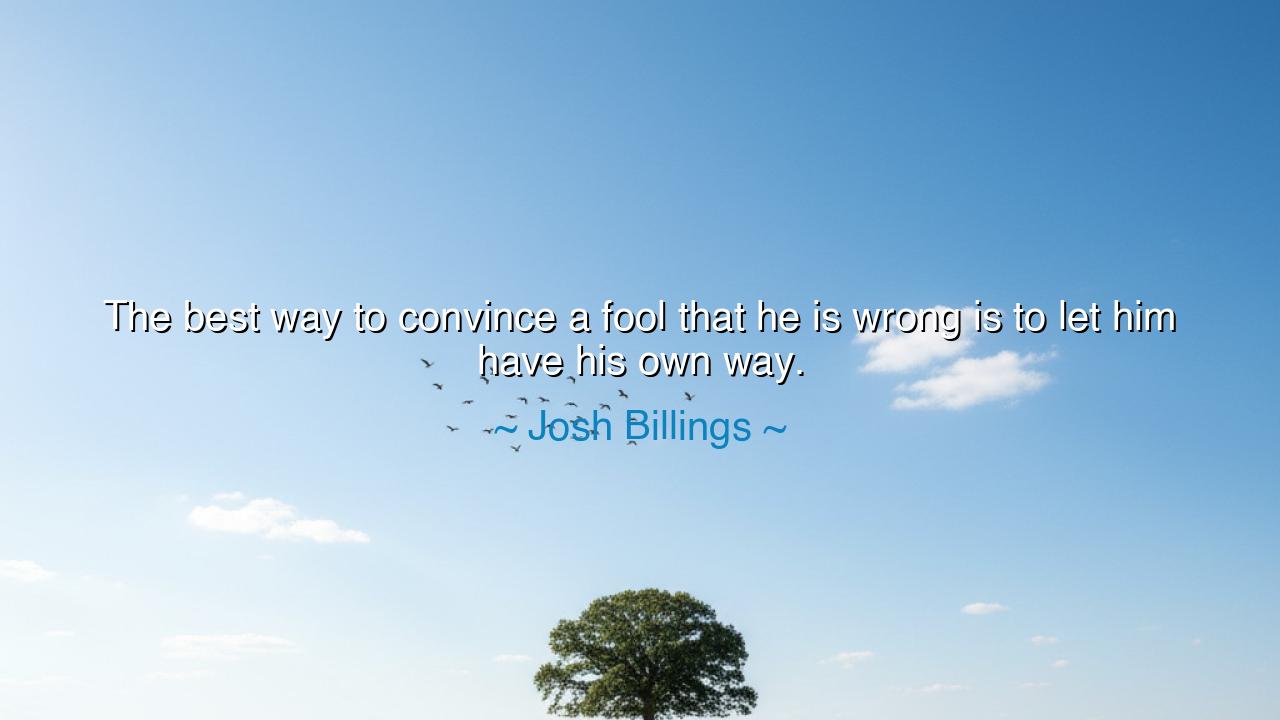
The best way to convince a fool that he is wrong is to let him






The gentle murmur of the café filled the air, blending with the rhythmic tapping of rain against the window. Jack sat across from Jeeny, his coffee cup cradled in his hands, his gaze drifting toward the rain-soaked streets. Jeeny, sitting opposite him, seemed lost in thought, her fingers lightly tracing the rim of her cup.
Host: After a moment of silence, Jeeny spoke, her voice lighthearted, with a hint of curiosity.
Jeeny: “I came across a quote from Josh Billings today that made me smile. He said, ‘The best way to convince a fool that he is wrong is to let him have his own way.’ What do you think he means by that? Do you think letting someone go down their own path, even when it’s wrong, is the best way to teach them?”
Jack: He looked up, a small grin crossing his face. “I think Billings is pointing to something we all know but often resist: sometimes the best lesson is the one that comes through personal experience. People can argue, explain, and even warn, but when someone is determined to learn the hard way, the only thing that might actually convince them is for them to experience the consequences of their choices. It’s not about forcing them to see they’re wrong—it’s about letting them come to that realization on their own.”
Jeeny: “Exactly. It’s about allowing people to learn through their own mistakes, even when we can see where things are headed. In a way, it’s a form of patience—trusting that, if they’re given the freedom to make their own decisions, they’ll eventually see the truth for themselves. It’s also about understanding that no matter how much we might want to convince someone, direct confrontation or argument often doesn’t lead to change. Experience tends to be the most effective teacher.”
Host: The rain outside had softened, leaving a quiet stillness in the café. Jack shifted slightly, his fingers still resting on his coffee cup as he continued.
Jack: “I think it’s also about respecting people’s autonomy. As much as we might want to help or protect someone, we can’t always take away their agency—especially when it comes to learning. If we’re constantly stepping in and trying to correct someone’s course, we risk taking away the opportunity for them to make their own decisions. And in the end, it’s their journey, not ours. Sometimes, the only way to help them understand is to let them go ahead and realize it for themselves.”
Jeeny: “Yes, and there’s a kind of wisdom in that. It’s not about sitting back and watching someone fail for the sake of it; it’s about understanding that growth often comes from facing the consequences of our own actions. It’s the only way we can truly internalize lessons and make lasting changes. In a way, it’s more humbling for the person who’s learning. If they come to that conclusion on their own, it’s much more meaningful than being told they’re wrong.”
Host: The conversation seemed to deepen, as they both reflected on the idea of letting people learn through their own experiences. Jack set his coffee cup down gently, his expression softening.
Jack: “Exactly. It’s about creating space for someone to figure things out for themselves, even if we know the outcome. And I think it’s also a reminder to let go of the need to always be right or to correct others. Sometimes, the best way to help someone is to simply let them experience the truth. They’ll arrive at it eventually, and when they do, it will have more impact than if we had tried to tell them all along.”
Jeeny: Her smile was small but filled with understanding. “Yes, and it’s a reminder that we don’t always need to force someone’s hand. Sometimes, the act of letting go is the most powerful thing we can do. When people are allowed to make their own choices, they’re more likely to own the lesson and take it with them.”
Host: The rain had stopped, leaving a quiet calm in the air. Inside, Jack and Jeeny sat in the realization that sometimes the best way to convince someone they’re wrong is not by arguing or pointing out their mistakes—but by allowing them to come to their own conclusion. Josh Billings’ words remind us that experience is often the best teacher, and by stepping back and letting people learn for themselves, we can help them arrive at a deeper understanding that they’ll carry with them for a lifetime.






AAdministratorAdministrator
Welcome, honored guests. Please leave a comment, we will respond soon